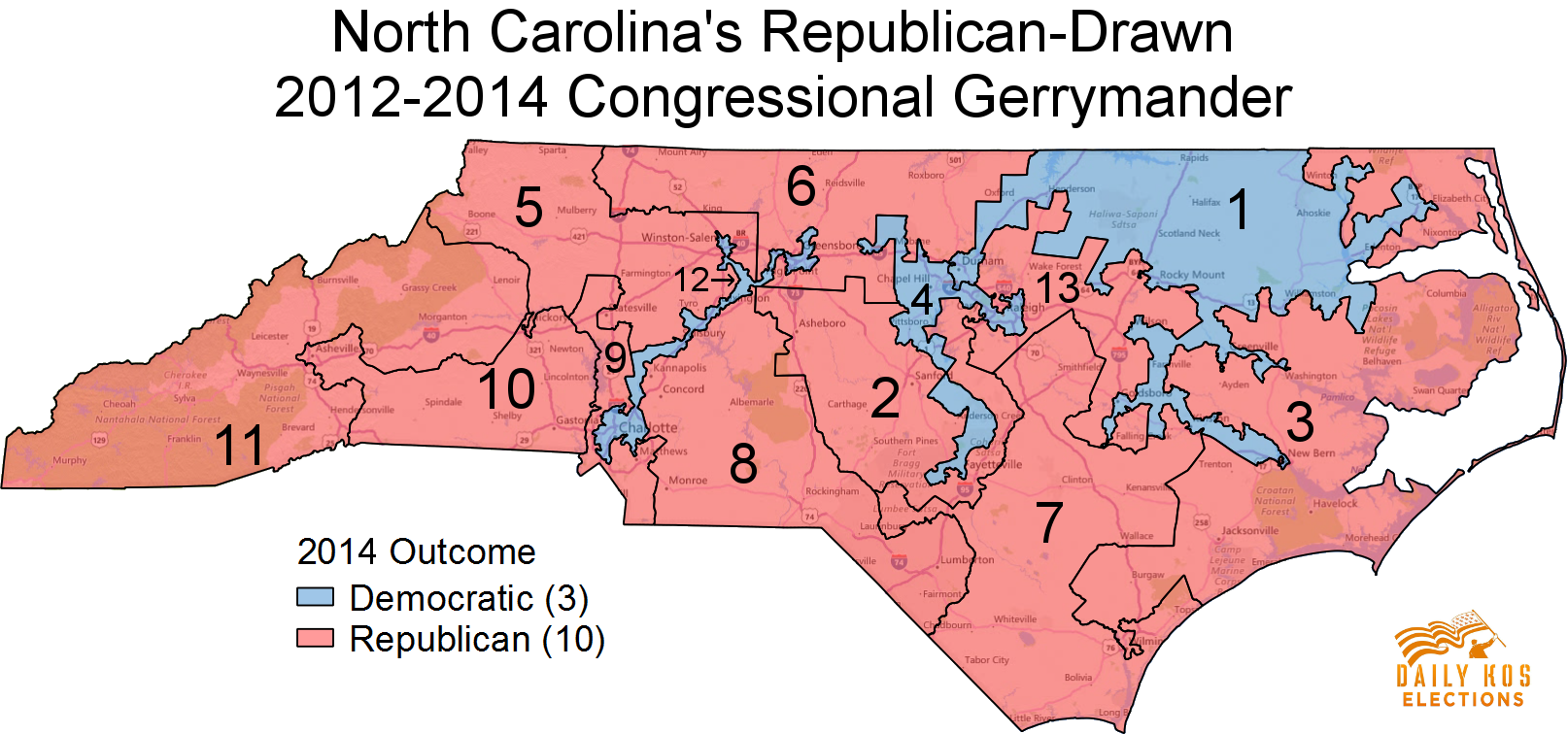We're taking a look at the impact of Republican gerrymanders on the 2016 congressional elections. Read why in our introductory post, and click here for the full series.
North Carolina’s Republican gerrymander is arguably the most aggressive one in the country, even after a 2016 court ruling forced Republicans to redraw their even crazier previous map for last year’s elections. What makes this gerrymander so extreme is how it takes a near-evenly divided state and deviously quarantines as many Democrats as possible into a mere three districts, then efficiently spreads out Republicans so that all 10 of their seats are relatively safe for Team Red yet don’t waste excess Republican voters who might have secured neighboring seats. Our nonpartisan proposal shown above (see here for a larger version) produces a far more equitable partisan outcome.
Our proposed map no longer combines the state capital of Raleigh with the two other biggest cities of the Triangle region into one Democratic vote sink, but it anchors its own safely Democratic 13th District that favored Clinton by 62-35, which would be unwinnable for Republican Rep. George Holding. It also adds another Clinton district by uniting the three core cities of the Piedmont Triad—Greensboro, Winston-Salem, and High Point—into one compact urban 9th District instead of cracking them into three separate districts. Freedom Caucus GOP Rep. Ted Budd would have had no hope of winning this 61-37 Clinton seat, but instead it would likely favor a black Democrat, increasing the number of black representatives by one.
Reuniting Asheville in western North Carolina turns the 11th District from one that Trump carried 63-34 into a considerably smaller 57-40 margin. That Trump edge is still substantial, but the redrawn seat has a long history of voting more Democratic downballot—indeed, Democratic Gov. Roy Cooper lost it just 51-46 last year. It’s almost identical to the district that Democratic ex-Rep. Heath Shuler won 54-46 even in the 2010 GOP wave. A popular moderate, Shuler almost certainly only retired in 2012 because of Republican gerrymandering, and there’s a strong chance he’d have been running in 2016 as an incumbent instead of GOP Rep. and Freedom Caucus Chairman Mark Meadows.
Republicans skillfully cracked pockets of Democratic strength in Fayetteville and southeastern North Carolina, but our proposal unites Fayetteville into the 2nd District while 9th District GOP Rep. Robert Pittenger’s seat gets eliminated entirely. Trump won the 2nd just 52-45, but it saw several much closer races at the statewide level in 2016. Then-GOP Rep. Renee Ellmers likely still would have lost the primary to a more extreme Republican due to her unpopularity with GOP voters, making this an open seat where Democrats may have had a fighting chance.
Removing Raleigh exurbs and restoring Wilmington and Lumberton to the 7th means entrenched conservative Democratic Rep. Mike McIntyre likely would not have retired in 2014 after he won by a razor-thin margin in 2012 in the much redder gerrymandered 7th in reality. Although our hypothetical seat favored Trump 55-42, it has long been much more Democratic downballot. Cooper lost it just 53-45 in 2016 and Democratic Sen. Kay Hagan by only 49-46 in 2014, barely worse than her 49-47 statewide loss that year. McIntyre’s immense crossover appeal would have made him a formidable candidate for Democrats.
Eliminating one of the strongest GOP gerrymanders in the country most likely would have netted Democrats two extra safe seats and another two swing seats thanks to entrenched incumbents, for a grand total of four additional districts in 2016.
The first map below shows the replacement congressional gerrymander that Republicans implemented for 2016 following last year’s court ruling.
 Click to enlarge
Click to enlarge
The second map shown here is the one that North Carolina used in the 2012 and 2014 elections that was struck down for unconstitutional racial gerrymandering in the majority-black 1st and 12th districts. It’s quite possibly the most extreme congressional gerrymander ever drawn in the modern era.
 Click to enlarge
Click to enlarge


